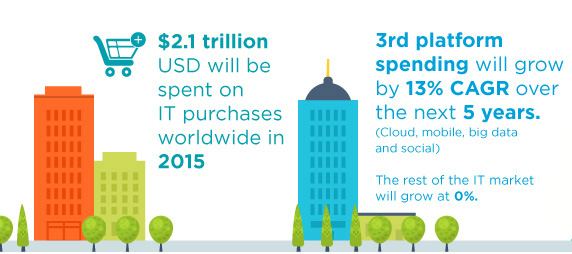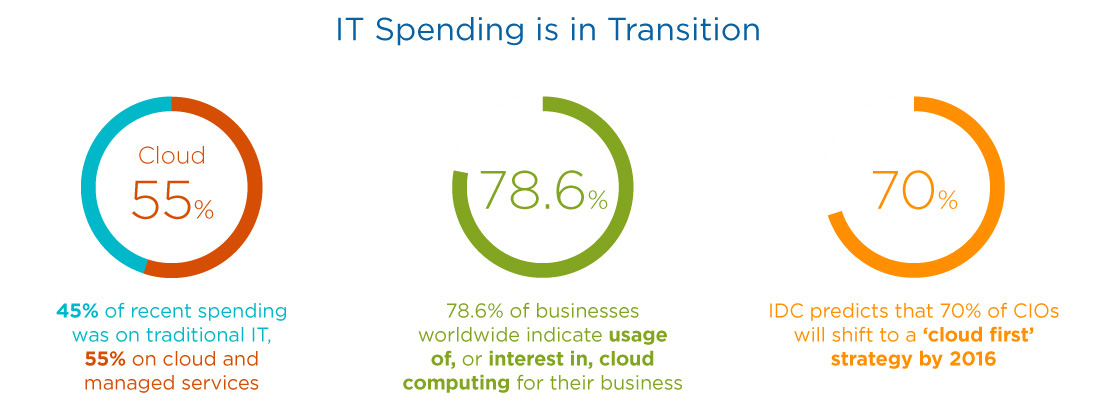Customers want partners, Microsoft knows partners

IT spending is in state of transition.
In the last year, we found that customers spend more than half of their IT budget (55 per cent) on cloud and managed services versus traditional IT (45 per cent). IDC made the prediction a couple years ago that 70 per cent of CIOs will shift to a ‘cloud first’ strategy by 2016. They may not always choose cloud, but they will always investigate the public cloud option first before moving to another model. There is great opportunity and great change ahead for partners.

Demand for partners continues
We at IDC are always trying to better understand the go to market strategies of large IT vendors, and the inner workings of business partners that play a key role in getting solutions to customers. A recent survey of IT solutions purchasers we did with Microsoft underscored yet again the importance of the IT partner channel for our industry's future.
The research indicates that there continues to be a tremendous demand for partners, as a vast majority of customers purchase technology—including cloud services—through the channel. In fact, 86 per cent of business customers indicate that they buy IT solutions through channel partners, with significant partner engagement across all size categories. Of course, many customers also buy directly from IT vendors also.
Why partners are the preferred choice
But there are many reasons why the partner route to market is often the preferred choice versus going direct to a software publisher:
- Companies are looking for comprehensive advice on how to go to the cloud, (among other technology questions.)
- Many are looking to meet someone in person versus over the phone, especially at the start of the purchase process. Business partners can cover local customer needs very effectively, especially those of small and medium business (SMB) customers.
- Many companies are seeking to simplify their technology investments and are looking to managed service providers and other partners to take that worry off of their minds.
- Many are looking for sources that can truly be trusted advisors around both technology and specific business processes or vertical industries. Partners who can speak intelligently about the industry metrics of the customer will be well ahead of the game.
- Of course, many times a customer wants help in choosing the right vendor and product. In a recent survey of business partners, customers are asking for a specific vendor’s product 44 per cent of the time. That means 56 per cent of the time, they are open to the advice of a partner (and even those with preferences will be interested in hearing about attractive alternatives.)

Good service matters more than a good price
Our survey sponsored by Microsoft also showed that customers are overwhelmingly interested in good service over price. 72 per cent of respondents said that they were willing to pay a premium for good customer service while only 28 per cent said they would forgo good service for a lower price.
This spells out a big opportunity for Value Added Partners to really emphasize their "value-add." Don’t feel like you need to match every low price offer you hear about, especially if you can show how your solutions will produce long term benefit.
Microsoft knows partners
And while there are clearly a lot of IT partnering opportunities out there, Microsoft boasts a couple of key value propositions for its existing partners, and prospective ones. First, Microsoft is a leading cloud technology innovator. Other blogs and articles can provide the details of Office 365, CRM, Azure and more.
But Microsoft is clearly a partner-oriented company. IDC believes that Microsoft uses partners to generate more than 92 per cent of its revenue. By contrast, the rest of the software industry gets about 39 percent of its revenue through indirect channels such as VARs, SIs, OEMs, MSPS and other partners. While changing business models will have an impact on how and where partners generate revenue, it is clear that Microsoft’s success will continue to be partner-led.
It's a good time to be a Microsoft partner.
By Darren Bibby, VP, Channels and Alliances Research, IDC
What the stars mean:
★ Poor ★ ★ Promising ★★★ Good ★★★★ Very good ★★★★★ Exceptional
Latest News
More News
- State corporations poised to drive 2026 growth (February 03, 2026 | 13:58)
- Why high-tech talent will define Vietnam’s growth (February 02, 2026 | 10:47)
- FMCG resilience amid varying storms (February 02, 2026 | 10:00)
- Customs reforms strengthen business confidence, support trade growth (February 01, 2026 | 08:20)
- Vietnam and US to launch sixth trade negotiation round (January 30, 2026 | 15:19)
- Digital publishing emerges as key growth driver in Vietnam (January 30, 2026 | 10:59)
- EVN signs key contract for Tri An hydropower expansion (January 30, 2026 | 10:57)
- Vietnam to lead trade growth in ASEAN (January 29, 2026 | 15:08)
- Carlsberg Vietnam delivers Lunar New Year support in central region (January 28, 2026 | 17:19)
- TikTok penalised $35,000 in Vietnam for consumer protection violations (January 28, 2026 | 17:15)
















 Mobile Version
Mobile Version